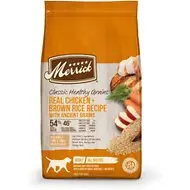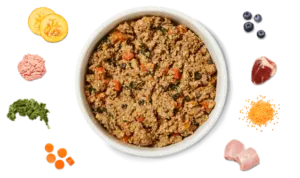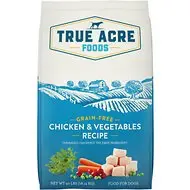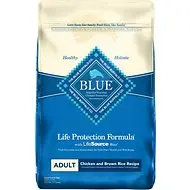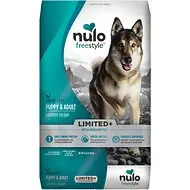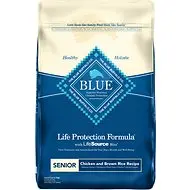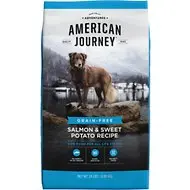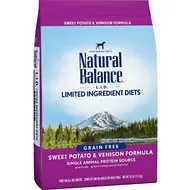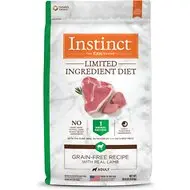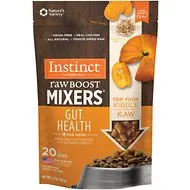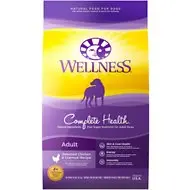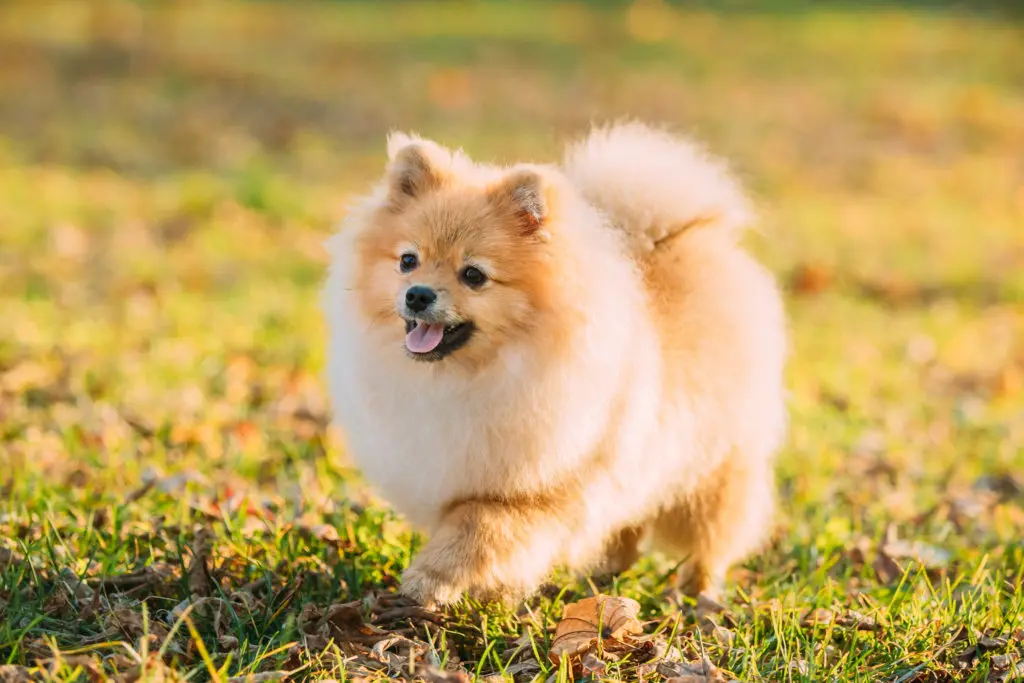11 Best Dog Foods for Pomeranians in 2024
Quick Guide
- What is the Best Dog Food for a Pomeranian?
- 5 Key Nutritional Needs of a Pomeranian Diet
- 6 Special Dietary and Nutritional Considerations of Pomeranians
- Pomeranian Feeding Schedule
- Overall Best Dog Food for Pomeranians
- 10 More Top-Rated Dog Foods for Pomeranians
- 2. Fresh/Super Premium: Ollie
- 3. Most Popular: True Acre Foods Chicken and Vegetable Dry Dog Food
- 4. Best Value: Blue Buffalo Life Protection Formula
- 5. Pea Free: American Natural Premium Original Recipe
- 6. Best for Puppies: Nulo Freestyle Salmon and Peas Puppy Dry Food
- 7. Best for Seniors: Blue Buffalo Life Protection Senior Formula
- 8. American Journey Salmon & Sweet Potato Recipe Grain-Free Dry Dog Food
- 9. Natural Balance LID Sweet Potato and Venison Dry Dog Food
- 10. Instinct Limited Ingredient Diet
- 11. Wellness Complete Health Deboned Chicken and Oatmeal Dry Dog Food
- Our 2024 Pomeranian Feeding Guide
- Conclusion
They’re friendly, bold and full of life. Although energetic, they don’t require tons of space for exercise, making them an ideal companion for apartment dwellers, seniors, and anyone else who doesn’t want to partake in long, frequent walks. Plus, with a loyal disposition and a surprisingly loud bark, they’re ideal watchdogs and family protectors.
Originally bred as a miniature version of a sled dog, Poms’ modern-day popularity is almost single-handedly attributed to Queen Victoria. She became enamored with the breed after a trip to Italy, returning to Britain with several as pets. First owned primarily by royalty, soon these pups became favorites of the common folk throughout the kingdom, and have remained popular ever since.
It’s easy to see why the Queen and so many others love these diminutive dogs. With bright, alert faces and full, fluffy tails, they’re adorable and delightful. On average, they stand about six to seven inches high and weigh between three to seven pounds.
While generally low-maintenance pets, their unique size and breeding history does create some potential health issues. Watch out for issues related to their joints, weight, and skin. Selecting the right food plays an important role in keeping your dog happy and healthy. Providing them with proper nutrition from a young age helps potentially minimize genetic issues later in life.
If you’re looking for info on what to feed a Pomeranian, you’re in the right place. Check out our top 2024 Pomeranian dog food recommendations plus a feeding guide, nutrition information, and much more. You and your dog deserve a long, happy life together – and that starts with selecting the right food. Here’s more:
What is the Best Dog Food for a Pomeranian?
- 1. Our Top Pick: Merrick Classic Chicken + Brown Rice with Ancient Grains
- 2. Fresh/Super Premium: Ollie
- 3. Most Popular True Acre Foods Chicken and Vegetable Dry Dog Food
- 4. Best Value: Blue Buffalo Life Protection Formula
- 5. Pea Free: American Natural Premium Original Recipe
- 6. Best for Puppies: Nulo Freestyle Salmon and Peas Puppy Dry Food
- 7. Best for Seniors: Blue Buffalo Life Protection Senior Formula
- 8. American Journey Salmon & Sweet Potato Recipe Grain-Free Dry Dog Food
- 9. Natural Balance LID Sweet Potato and Venison Dry Dog Food
- 10. Instinct Limited Ingredient Diet
- 11. Wellness Complete Health Deboned Chicken and Oatmeal Dry Dog Food
5 Key Nutritional Needs of a Pomeranian Diet
With their small size, Poms are predisposed towards a variety of heart, joint, and skin issues. Fortunately, these issues are often effectively managed and even prevented by the right diet. Here’s a closer look at the specific nutritional needs of Pomeranians:
- Fat: Choose food with both essential and non-essential fats, including both omega-3 and omega-6 fatty acids. Fats help boost skin, coat, and immune system health while reducing inflammation around the joints. As with proteins, dogs need fats from animal-based sources instead of plant-based ones. Your Pom can’t utilize plant-sourced fats, and will eventually develop patchiness, itchiness, and other issues.
- Carbs: Carbohydrate sources such as whole oats, brown rice, and vegetables mainly serve as a source of fiber for dogs. While some carbs are necessary, most animal experts recommend food with a fairly low level of them. Although specifics vary, dog foods should have a fiber content around 4%. Anything above 7% usually means the food has excessive plant sourcing and will be difficult for your dog to digest properly.
- Water: Generally speaking, dogs should drink between a half-ounce to an ounce of water per pound of body weight each day. Although that’s not a huge quantity of water, it’s important to always provide your pet with access to fresh water at all times. Additionally, most Poms prefer dry food over wet, so they’re only getting a minimal amount of hydration through food.
- Vitamins: Don’t give your dog extra vitamins or other supplements unless directed by your vet. Generally, dogs don’t handle additional vitamins well. They’re typically excreted before absorption, or they cause nausea. Instead, dogs should get their daily allowance of vitamins and minerals from their food.
- Protein: Protein performs numerous vital functions in your dog’s body (and in yours, too). It supplies key amino acids that are necessary for proper development of skin, hair, muscles, tendons, and more. Although the specific numbers vary, experts recommend adult dogs should consume food with a protein content between 15 to 25%. However, there is no specific evidence food with a higher protein content is harmful.
Additional Information on Protein
Protein is arguably the single most important ingredient in your dog’s food, so let’s cover some additional details to help you when developing your dog’s diet:
It’s important to feed your dog animal-based proteins such as poultry, fish, eggs, and beef. Avoid plant-sourced proteins like peas and lentils. Only animal proteins provide the full range of amino acids your dog needs to stay healthy.
Common animal proteins include chicken, beef, turkey, and fish. All animal-based proteins provide the same nutrition, so the choice depends on your pet’s preference. Like people, dogs prefer certain flavors over others.
However, it’s important to know that dogs can develop protein allergies. If they become allergic to the protein in their food, you’ll need to switch to a diet based on a protein they’ve never eaten before. It’s often simpler to diagnose food allergies if you feed your dog food that contains a single protein, instead of a blend.
6 Special Dietary and Nutritional Considerations of Pomeranians
As Pomeranian fans already know, these dogs are a one-of-a-kind. However, their unique shape and size create a few breed-specific needs regarding nutrition. Here’s a closer look at the relationship between food and health for Pomeranians:
- Musculoskeletal Issues: Due to their small bone structure, Poms have an increased risk of developing a variety of mobility problems. The biggest concern is hip dysplasia, a condition where the leg slips in and out of the socket. A similar condition called luxating patella occurs with the kneecaps. These musculoskeletal issues are a major reason why your Pom needs food with high levels of animal-based protein and essential fatty acids.
- Allergies: Pomeranians are susceptible to a variety of food allergies, especially plant-based proteins as peas and lentils. They can also develop an allergy to a meat protein they’ve eaten for years. Signs of food allergies include frequent scratching, unexplained hair loss, vomiting, and weight loss. A common treatment for food allergy involves switching to a new food with an animal-based protein your dog has never eaten before, such as venison or fish.
- Calorie Needs: Generally, dogs need about 40 calories a day per pound of body weight, although that number varies based on age, activity level, overall health, and other factors. Unfortunately, it doesn’t take many extra calories for a Pom to pack on the pounds, leading to strain on the joints and major organs. Monitor the type and amount of food to make sure your dog’s caloric intake is appropriate for their needs but not excessive (your vet can help determine the specifics).
- Dietary Restrictions: Most Pomeranians are enthusiastic eaters and will likely want a sample of whatever you’re eating. While you want to avoid giving your dog “people food,” we understand it’s often hard to resist those big puppy-dog eyes every time. However, never give your dog the following foods: avocado, candy, gum, chocolate, onions, or caffeine. They’re dangerous and potentially even fatal.
- Raw Diets: Raw diets are a popular pet food fad. They consist of raw meat, uncooked bones, a few organs, and a small number of fruits and veggies. However, while raw diets aren’t necessarily harmful, they’re usually not recommended, either. Many dogs initially struggle to properly digest raw meat until their body becomes comfortable with it. Plus, creating your own dog food is time-consuming and often difficult, because you have to make sure it has the proper levels of nutrients.
- Grain-Free Diets: As discussed above, dog food with high grain content can increase obesity and limit nutritional benefits in dogs. However, that doesn’t necessarily mean dogs need a completely grain-free diet. As long as the main ingredients are animal-based proteins and fats, food with some grain content is usually fine for most healthy, adult dogs. Check with your vet for advice for your specific dog.
Keep in mind that high-quality food can help manage and minimize generic issues; it’s not a magical cure, especially related to common problems such as hip dysplasia. Your dog’s diet is only one part of an overall treatment plan you’ll create with your vet.
Pomeranian Feeding Schedule
How often and how much should I feed my Pomeranian?
Generally, adult Poms need between a quarter and a half-cup of food per pound of body weight.
| Pomeranian Body Weight | Amount of Dry Food per Day |
| 3 lbs | .75 to 1.5 cups |
| 5 lbs | 1.25 to 2.5 cups |
| 7 lbs | 1.75 to 3.5 cups |
| 10 lbs | 2.5 to 5 cups |
Pomeranians average about seven pounds, so two to three cups is a fairly typical amount of daily food. However, you don’t want to feed them the entire amount at once. Instead, you should feed adult Poms twice a day, and puppies between two and four times a day.
Interestingly, Pomeranians are one of the few breeds where free-feeding is sometimes a possibility. Free feeding is when you leave a bowl of food out at all times for your dog to eat. Some Poms will only eat an appropriate amount of food each day. However, if your Pomeranian eats with reckless abandon, you’ll need to feed him meals.
Pomeranian Puppy Feeding
Pom puppies have different feeding needs than adults. First, they can’t eat freely. Puppies simply don’t have the self-control to free eat, and will likely chow down until they’re sick if food is constantly available. As they mature, free eating is an option for some Pomeranians, but not during the first year or so.
Additionally, puppies need different amounts of food. Generally, they need half of a cup of food per every pound of body weight. For example, a two-pound Pom needs a half a cup of food each day, while a six-pound dog needs two cups.
Overall Best Dog Food for Pomeranians
| Our 2024 Picks: Best Pomeranian Dog Food | |||
Merrick Classic Chicken + Brown Rice with Ancient Grains
|
CHECK PRICE | ||
Ollie
|
CHECK PRICE | ||
True Acre Foods Chicken and Vegetable Dry Dog Food
|
CHECK PRICE | ||
Blue Buffalo Life Protection Formula
|
CHECK PRICE | ||
American Natural Premium Original Recipe Dry Dog Food
|
CHECK PRICE | ||
Nulo Freestyle Salmon and Peas Puppy Dry Food
|
CHECK PRICE | ||
Blue Buffalo Life Protection Senior Formula
|
CHECK PRICE | ||
American Journey Salmon & Sweet Potato Recipe Grain-Free Dry Dog Food
|
CHECK PRICE | ||
Natural Balance LID Sweet Potato and Venison Dry Dog Food
|
CHECK PRICE | ||
Instinct Limited Ingredient Diet
|
CHECK PRICE | ||
Wellness Complete Health Deboned Chicken and Oatmeal Dry Dog Food
|
CHECK PRICE | ||
Our Top Pick: Merrick Classic Chicken + Brown Rice with Ancient Grains
It’s a classic favorite among Pom owners for a reason. Merrick’s Classic Chicken and Brown Rice recipe is a unique formula packed with real chicken, fruits, whole grains, and a variety of necessary nutrients. It directly targets multiple issues specific to the breed.
The animal-based protein provides all the amino acids your dog needs for healthy lean muscle development. Strong muscles, especially in the limbs, help prevent hip dysplasia and luxating patella. Also, the protein content is high enough to maintain your dog’s energy levels all day long.
The formula also contains whole and ancient grains. They aid digestion, which is helpful for Pomeranians for all ages, but especially seniors. Finally, the formula has a winning combination of omega-3, omega-6, Glucosamine, and chondroitin. Together, these valuable minerals and fatty acids promote joint, skin, and coat health.
10 More Top-Rated Dog Foods for Pomeranians
Although our top recommendation is a great choice, it’s not perfect for every pet. If you want other options to consider, here are 10 more highly-rated dog food selections:
2. Fresh/Super Premium: Ollie
Key Features: Feed your dog a meal so fresh you can eat it yourself. Ollie is a super-brand that makes custom meals for your pup and delivers them right to your door.
When you sign up for Ollie, you choose between beef, chicken, lamb, or turkey. You can customize the portions and several other characteristics to create a dog food specifically designed for your dog’s needs.
Many people prefer the fresh ingredients of Ollie, although human-quality food isn’t strictly necessary for a dog’s health. Additionally, like any fresh food, you can’t store it long-term. However, it’s a tasty, healthy alternative to dry dog food.
Pros:
- Contains fresh, natural, human-quality ingredients
- Numerous customization options allow you to design unique dishes
- Delivered directly to your door via subscription service
Cons:
- Only storable for a limited time
- Human-quality food isn’t necessary for a dog’s diet
- Relative high cost compared to dry food with similar nutritional value
3. Most Popular: True Acre Foods Chicken and Vegetable Dry Dog Food
Key Features: When selecting dog food for your Pomeranian, choose a formula that will provide enough energy for his needs. This dry dog food from True Acre is packed with fresh, US-raised chicken to provide all the amino acids your Pom requires for all-day fuel.
Don’t want artificial colors and ingredients in your food? No problem! The formula contains little more than meat and vegetables. You’ll find no corn, grains, or wheat.
Plus, it’s a good choice for senior dogs. The formula boosts immune system health and helps grow lean muscle mass, both of which can decline as your dog ages.
Pros:
- Doesn’t contain artificial colors, flavors, grains, corn, or wheat
- Delivers a full range of required amino acids
- Ideal for adult and senior Poms
- Helps maintain a healthy immune system
Cons:
- Has a strong odor and somewhat odd coloring
- Ingredients include small amounts of soybean meal and beet pulp
4. Best Value: Blue Buffalo Life Protection Formula
Key Features: You don’t have to spend big to keep your Pom active and healthy. Blue Buffalo packs more nutrition per dollar than practically any other high-quality food on the market. Their Life Protection Formula contains real chicken plus whole grains and a Super 7 package of antioxidants.
The unique shape of the small kibble is ideal Pomeranians. It’s specifically designed to help remove tartar build-up from tiny teeth. Considering Poms have an increased risk of tooth decay, this formula can help prevent dental problems from occurring.
Pros:
- Contains a full range of necessary amino acids from animal proteins
- Unique kibble shape helps clean teeth and remove tartar
- Includes Glucosamine for joint health
- Great value compared to brands of similar quality
Cons:
- Grain-free foods might not be necessary for your dog. (Consult your vet.)
- Kibble flavor varies across pieces
- Some dogs might not like the taste
5. Pea Free: American Natural Premium Original Recipe
Key Features: Peas are often used as a filler in low-quality dog food, so pea-free formulas often indicate a quality product. American Natural’s Premium Original Recipe is an excellent option for Pomeranians because it provides the energy your tiny pup needs to stay healthy and active all day long.
It’s like a mini-Thanksgiving meal for your dog with deboned turkey and fresh pumpkin. Prebiotics, probiotics, and other ingredients help promote efficient immune system function. Additionally, omega-3 fatty acids help reduce skin itchiness and irritation.
Pros
- Contains no peas, corn, wheat, soy, or artificial ingredients
- Boosts immune system function
- Omega-3 reduces skin irritations and hair patchiness
- Deboned turkey is the primary ingredient
Cons
- Kibble has a greasy texture
- Strong, unappetizing smell (although your dog might have a different opinion)
- Kibble pieces are small even by small-breed standards
6. Best for Puppies: Nulo Freestyle Salmon and Peas Puppy Dry Food
Key Features: Packed with amino acids and essential fatty acids, Nulo FreeStyle dry food promotes healthy growth. It’s our top choice for Pomeranian puppies due to its small kibble and excellent nutrition content.
Puppy food plays a vital role in the lifelong health of your Pomeranian. You can rest easy with Nulo’s Freestyle food because 80% of its proteins are derived from real deboned salmon. It supplies all of the essential amino acids young dogs need.
Also, it includes DHA fatty acids and calcium, both of which play an important role in Pom health. The DHA fatty acids help his brain and eyes develop correctly, while guaranteed calcium levels help strengthen growing bones. Considering two of the breed’s biggest issues involve problems with the eyes and joints, Nulo’s blend is ideal for growing Poms.
Pros:
- Deboned salmon provides 80% of proteins
- Helps develop the brain, eyes and skeletal system
- Ideal for helping reduce common Pom conditions
Cons:
- Grain-free formula not recommended for all dogs
- Very young dogs might need smaller kibble
7. Best for Seniors: Blue Buffalo Life Protection Senior Formula
Key Features: Designed specifically for senior dogs, Blue Buffalo’s Senior Protection Formula contains real meat, whole grains, and a variety of other ingredients to keep your dog active as he ages.
Senior dogs have unique needs, and often increased health challenges, which require special nutritional requirements. The high-quality protein includes L-Carnitine to help muscles stay strong, plus Glucosamine and chondroitin to help joints and ligaments stay flexible. Also, a variety of antioxidants, vitamins, and minerals help keep your Pom’s immune system functioning at optimal efficiency.
Pros
- Ingredients help reduce the risk of joint and mobility issues
- Includes Super 7 blend of antioxidants
- Formulated for senior dogs
Cons
- Contains less Glucosamine than other Blue formulas
- Not all dogs like the taste and smell
8. American Journey Salmon & Sweet Potato Recipe Grain-Free Dry Dog Food
Key Features: American Journey Salmon & Sweet Potato Recipe is specifically designed for easy digestions. It’s ideal for any dog with a sensitive stomach or picky palette. With a blend of chicken, pork, fish, and eggs, it’s packed with the nutrition your dog needs to stay strong and active.
It’s one of the few foods on the market to include probiotics, which help aid digestion and boost immune system function. As an added bonus, probiotics improve stool consistency and reduce odor. Plus, it delivers all-day energy with a blend of complex carbohydrates that includes brown rice, barley, and oat flour.
Pros:
- Small-sized kibble suitable for adult Poms
- Features probiotics and complex carbs to aid digestion
- Includes chicken, pork, fish, and eggs for all-day energy
- Doesn’t include peas, corn, or soy
Cons:
- Wide range of proteins could potentially act as allergens
- Multiple proteins create a strong smell (which your dog may or may not care about)
- The bag isn’t resealable, so food can harden over time
9. Natural Balance LID Sweet Potato and Venison Dry Dog Food
Key Features: If your Pomeranian has a sensitive stomach or food allergy, give him Natural Balance’s Limited Ingredient Diet. With a limited ingredient list of venison and sweet potatoes, it delivers complete nutrition to dogs who can’t eat more common proteins like chicken, beef, or fish.
Venison provides the full range of amino acids that Poms need to maintain healthy muscle tone and functions. Plus, the sweet potatoes act as a gentle source of fiber to aid digestion. It also has minimal carbohydrates, which helps reduce stomach upset.
Limited ingredient diets are typically used to diagnose potential allergens. While this formula provides complete general nutrition, you might want to eventually switch to a different food geared more towards your dog’s specific needs, such as food to improve mobility or for seniors.
Pros:
- An ideal treatment for dogs with food allergies
- Provides all necessary amino acids and essential fats
- Helps diagnose potential sources of allergies
Cons:
- Limited ingredient diets are typically used temporarily
- Formula recently changed, and the new taste might not appeal to your dog
10. Instinct Limited Ingredient Diet
Key Feature: Instinct’s Limited Ingredient Diet contains just a single protein and vegetable, making it an effective option for dog’s with potential food allergies. The main ingredient is lamb, an easy-to-digest protein that isn’t found in most types of dog food. Giving your dog a novel protein is the most effective way to identify and treat food allergies.
Pure and simple, Instinct’s Limited Ingredient Diet is nutritious and easy on a dog’s digestive system. It contains no grains, dairy, eggs, peas, or artificial preservatives. If your dog experiences symptoms of food allergies, switching to a limited edition diet is the first step towards better health.
Just because the ingredient list is short doesn’t mean it’s harmful to dogs. The lamb-and-vegetable blend contains the full range of amino acids your dog needs each day. Plus, the veggies help promote proper digestion, so the meal’s nutrients are easy to absorb.
Pros:
- Nutritious food with limited ingredient list
- Helps diagnose and treat many common food allergies
- Main ingredient of lamb is easy on your dog’s digestive system
- Contains no grains, artificial additives, or fillers
Cons:
- Not designed to treat yeast allergies
- Dogs might experience temporary issues after their food is switched
11. Wellness Complete Health Deboned Chicken and Oatmeal Dry Dog Food
Key Features: Wellness Complete lives up to its name by proving all the amino acids, fatty acids, and antioxidants your dog needs to live a long, healthy life. It features a mixture of proteins plus whole grains, fruits, and vegetables.
While grain-free food has its benefits, Wellness includes whole grains to help improve digestion. It’s ideal for Poms with sensitive stomachs, as well as older dogs who might have digestive issues. In addition to the grains, a medley of apples, potatoes, and blueberries also aid digestion while providing a full day’s supply of energy.
The main ingredient is deboned chicken and whitefish. Additionally, added Chondroitin Sulfate helps maintain healthy joints, which is especially important in Pomeranians.
Pros:
- A combination of chicken and whitefish delivers complete amino acids
- Fruits and grains help aid digestion
- Ideal for adults, seniors, and dogs with digestion issues
Cons:
- Multiple protein sources make diagnosing potential food allergies difficult
- Combination of chicken and fish doesn’t appeal to every dog.
Our 2024 Pomeranian Feeding Guide
Frequently Asked Questions
Don’t worry if you have questions about the best Pomeranian dog food, because we’ve got answers!
Is Grain-free Dog Food Good for Pomeranians?
100% grain-free food usually not necessary for Pomeranians. As long as the main ingredients are animal-sourced proteins and essential fats, some grains are okay, and can even help with digestion.
Do Pomeranians Have Allergies?
Some Pomeranians do have food allergies. Common signs include itchiness, hair loss, constipation, and diarrhea. Dogs can suddenly develop an allergy to a food they’ve eaten without issue for years. The most common allergen in dog food is protein.
Treating food allergies typically requires a temporary switch to a Limited Ingredient Diet, which is a dog food that contains only a few ingredients. The goal is to identify the dog’s specific food allergies and build a new diet around them.
When Should I Switch My Pomeranian from Puppy to Adult Food?
Generally, you want to switch a puppy to adult food when they’ve reached their adult height. Because Pomeranians are a small dog, it doesn’t take them long to finish growing.
In most cases, you can make the switch when the dog is about a year old, or possibly even a few months earlier. Remember, even though you’re feeding him adult dog food, make sure you give food made for small breeds.
Should I Feed My Pom Dry or Wet Food?
As long as it contains the proper type and amount of nutrients, a healthy, adult Pom can eat either wet or dry food. Some dogs prefer wet; others prefer dry, and some dogs will happily eat both.
Pomeranians are prone to dental issues. If your dog normally eats dry food but suddenly stops, he might have tooth pain. Take him to a vet for a check-up, and try switching to wet food, which he’ll have an easier time chewing.
Conclusion
Pomeranians are intelligent, friendly, and loyal companions who are a welcome addition for practically any family. However, due to their small size and unique breed attributes, proper nutrition plays a key role in keeping them healthy.
Choose a dog food with animal-based proteins and essential fatty acids. Also, make sure to feed him the proper amount for his age, weight, and activity level. Use our guide, and consult with your vet, to determine the best way to feed your dog.
All of the products listed above are highly rated and packed with the nutrition your Pomeranian needs. With the help of the right food, you and your Pom can enjoy a happy life together for a long time.



